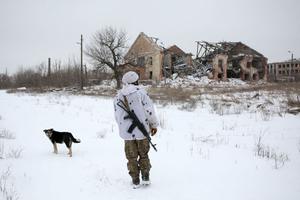Moscow Archdiocese Urges Return of Memorial for Bishop Imprisoned by Stalin Regime
Earlier this month, plaques dedicated to political and religious prisoners who died at Vladimir Central Prison under the communist regime were removed. This included a plaque honoring Archbishop Mecislovas Reinis, whose cause for sainthood is reportedly being investigated.

The Roman Catholic Archdiocese of the Mother of God at Moscow is urging the Prince Vladimir Cemetery in Vladimir, Russia, to restore a memorial plaque that honored a Catholic archbishop who was imprisoned by Joseph Stalin’s regime in the Soviet Union until his death.
Earlier this month, plaques dedicated to political and religious prisoners who died at Vladimir Central Prison under the communist regime were removed. This included a plaque honoring Archbishop Mecislovas Reinis, whose cause for sainthood is reportedly being investigated. He was imprisoned in the Vladimir Central Prison from 1947 until his death in 1953.
“The memory of Archbishop Reinis is preserved among Catholics in Russia, in particular, a memorial plaque was installed for him in the Church of the Holy Rosary of the Blessed Virgin Mary in Vladimir,” Father Kirill Gorbunov, the vicar general of the archdiocese, said, according to the state-owned media outlet RIA Novosti.
Gorbunov added that Archbishop Reinis “deserves to have his memory immortalized at the site of his martyrdom” and that “he was a true Christian and shepherd [who] testified his fidelity to Christ by martyrdom in prison, where he was unjustly accused” along with other prisoners of the communist government.
Archbishop Reinis was born in the Russian empire in 1884 and became a priest in 1907 and a bishop in 1926. He led the department of theoretical and experimental psychology at Kaunas University in Lithuania and served as the Minister of Foreign Affairs for the Lithuanian government from 1925 to 1926.
The Archbishop first faced religious persecution from the Bolsheviks in Lithuania who arrested him in 1919 until he was released to Poland two years later through the Treaty of Riga. He returned to Lithuania where he was arrested again in 1947 after Stalin’s regime annexed the country. He was sentenced to eight years in prison, but only served six before he died in 1953.
“He shared the fate of many other believers, including Orthodox bishops who died there, in the Vladimir Central [Prison],” Gorbunov said. “It is also important for us that the life of Archbishop Reinis is inextricably linked with Russian culture — he graduated from the Theological Academy in St. Petersburg, wrote a doctoral thesis on Vladimir Solovyov, and was involved in popularizing Russian philosophy and psychology in the West.”
The Estonian Foreign Ministry has also criticized the removal of the plaques, which included one honoring an Estonian general, Johan Laidoner, who led the armed forces during the Estonian War of Independence and against a communist coup attempt in 1924. The government has requested that the plaque be given to Estonia, according to the Estonian publicly funded news outlet Eesti Rahvusringhääling.
“Estonia has issued a statement regretting the removal of the Laidoner monument and requesting that the plaque be returned to Estonia, as it is no longer suited for the cemetery in Vladimir,” a spokesperson for the ministry said. “We also want assistance locating Gen. Laidoner's remains and returning them to Estonia.”
The Polish ambassador to Moscow, Krzysztof Krajewski, also criticized the prison for removing several plaques that honored Polish prisoners of Stalin’s regime.
“We observe with sadness the consistent negative policy of the authorities, which removes places commemorating Poles,” Krajewski said, according to the Polish public service radio station, Polskie Radio 24.
“It happens under the cover of darkness, without any witnesses, no one can explain when or why, and if there are explanations, they are unfortunately untrue,” the ambassador added. “The most saddening and moving thing is that such actions take place in cemeteries.”
Krajewski held a ceremony on Sunday, Oct. 22 with his wife and colleagues at the location where the memorial used to be.
















